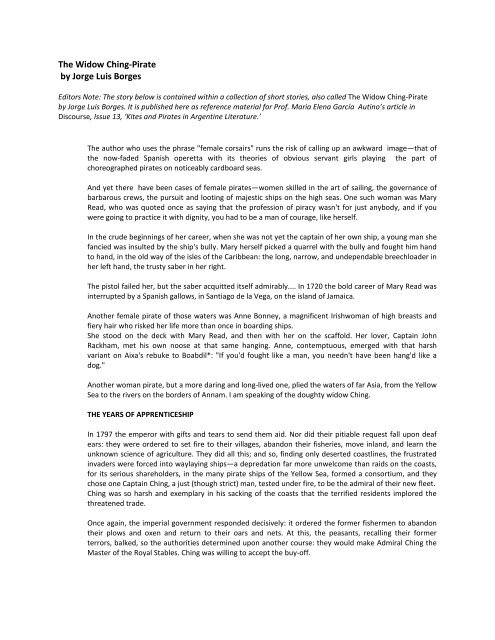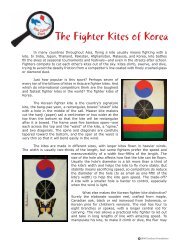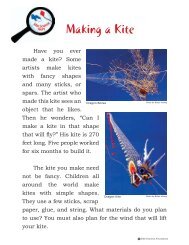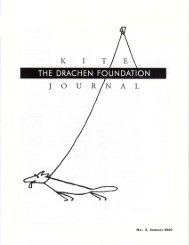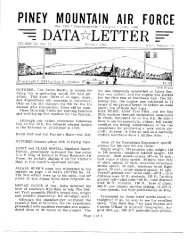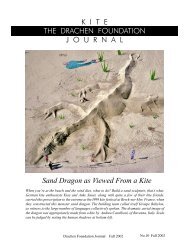The Widow Ching-Pirate by Jorge Luis Borges
The Widow Ching-Pirate by Jorge Luis Borges
The Widow Ching-Pirate by Jorge Luis Borges
Create successful ePaper yourself
Turn your PDF publications into a flip-book with our unique Google optimized e-Paper software.
<strong>The</strong> <strong>Widow</strong> <strong>Ching</strong>-<strong>Pirate</strong><br />
<strong>by</strong> <strong>Jorge</strong> <strong>Luis</strong> <strong>Borges</strong><br />
Editors Note: <strong>The</strong> story below is contained within a collection of short stories, also called <strong>The</strong> <strong>Widow</strong> <strong>Ching</strong>-<strong>Pirate</strong><br />
<strong>by</strong> <strong>Jorge</strong> <strong>Luis</strong> <strong>Borges</strong>. It is published here as reference material for Prof. Maria Elena García Autino’s article in<br />
Discourse, Issue 13, ‘Kites and <strong>Pirate</strong>s in Argentine Literature.’<br />
<strong>The</strong> author who uses the phrase "female corsairs" runs the risk of calling up an awkward image—that of<br />
the now-faded Spanish operetta with its theories of obvious servant girls playing the part of<br />
choreographed pirates on noticeably cardboard seas.<br />
And yet there have been cases of female pirates—women skilled in the art of sailing, the governance of<br />
barbarous crews, the pursuit and looting of majestic ships on the high seas. One such woman was Mary<br />
Read, who was quoted once as saying that the profession of piracy wasn't for just anybody, and if you<br />
were going to practice it with dignity, you had to be a man of courage, like herself.<br />
In the crude beginnings of her career, when she was not yet the captain of her own ship, a young man she<br />
fancied was insulted <strong>by</strong> the ship's bully. Mary herself picked a quarrel with the bully and fought him hand<br />
to hand, in the old way of the isles of the Caribbean: the long, narrow, and undependable breechloader in<br />
her left hand, the trusty saber in her right.<br />
<strong>The</strong> pistol failed her, but the saber acquitted itself admirably.... In 1720 the bold career of Mary Read was<br />
interrupted <strong>by</strong> a Spanish gallows, in Santiago de la Vega, on the island of Jamaica.<br />
Another female pirate of those waters was Anne Bonney, a magnificent Irishwoman of high breasts and<br />
fiery hair who risked her life more than once in boarding ships.<br />
She stood on the deck with Mary Read, and then with her on the scaffold. Her lover, Captain John<br />
Rackham, met his own noose at that same hanging. Anne, contemptuous, emerged with that harsh<br />
variant on Aixa's rebuke to Boabdil*: "If you'd fought like a man, you needn't have been hang'd like a<br />
dog."<br />
Another woman pirate, but a more daring and long-lived one, plied the waters of far Asia, from the Yellow<br />
Sea to the rivers on the borders of Annam. I am speaking of the doughty widow <strong>Ching</strong>.<br />
THE YEARS OF APPRENTICESHIP<br />
In 1797 the emperor with gifts and tears to send them aid. Nor did their pitiable request fall upon deaf<br />
ears: they were ordered to set fire to their villages, abandon their fisheries, move inland, and learn the<br />
unknown science of agriculture. <strong>The</strong>y did all this; and so, finding only deserted coastlines, the frustrated<br />
invaders were forced into waylaying ships—a depredation far more unwelcome than raids on the coasts,<br />
for its serious shareholders, in the many pirate ships of the Yellow Sea, formed a consortium, and they<br />
chose one Captain <strong>Ching</strong>, a just (though strict) man, tested under fire, to be the admiral of their new fleet.<br />
<strong>Ching</strong> was so harsh and exemplary in his sacking of the coasts that the terrified residents implored the<br />
threatened trade.<br />
Once again, the imperial government responded decisively: it ordered the former fishermen to abandon<br />
their plows and oxen and return to their oars and nets. At this, the peasants, recalling their former<br />
terrors, balked, so the authorities determined upon another course: they would make Admiral <strong>Ching</strong> the<br />
Master of the Royal Stables. <strong>Ching</strong> was willing to accept the buy-off.
<strong>The</strong> stockholders, however, learned of the decision in the nick of time, and their righteous indignation<br />
took the form of a plate of rice served up with poisoned greens. <strong>The</strong> delicacy proved fatal; the soul of the<br />
former admiral and newly appointed Master of the Royal Stables was delivered up to the deities of the<br />
sea.<br />
His widow, transfigured <strong>by</strong> the double treachery, called the pirates together, explained the complex case,<br />
and exhorted them to spurn both the emperor's deceitful clemency and odious employment in the service<br />
of the shareholders with a bent for poison. She proposed what might be called freelance piracy. She also<br />
proposed that they cast votes for a new admiral,<br />
and she herself was elected. She was a sapling thin woman of sleepy eyes and caries-riddled smile. Her<br />
oiled black hair shone brighter than her eyes.<br />
Under Mrs. <strong>Ching</strong>'s calm command, the ships launched forth into anger and onto the high seas.<br />
THE COMMAND<br />
Thirteen years of methodical adventuring ensued. <strong>The</strong> fleet was composed of six squadrons, each under<br />
its own banner—red, yellow, green, black, purple—and one, the admiral's own, with the emblem of a<br />
serpent.<br />
<strong>The</strong> commanders of the squadrons had such names as Bird and Stone, Scourge of the Eastern Sea, Jewel<br />
of the Whole Crew, Wave of Many Fishes, and High Sun.<br />
<strong>The</strong> rules of the fleet, composed <strong>by</strong> the widow <strong>Ching</strong> herself, were unappealable and severe, and their<br />
measured, laconic style was devoid of those withered flowers of rhetoric that lend a ridiculous sort of<br />
majesty to the usual official pronouncements of the Chinese (an alarming example of which, we shall<br />
encounter shortly). Here are some of the articles of the fleet's law:<br />
Not the least thing shall be taken privately from the stolen and plundered goods. All shall be registered,<br />
and the pirate receives for himself out of ten parts, only two: eight parts belong to the storehouse, called<br />
the general fund; taking anything out of this general fund without permission shall be death.<br />
If any man goes privately on shore, or what is called transgressing the bars, he shall be taken and his ears<br />
perforated in the presence of the whole fleet; repeating the same, he shall suffer death.<br />
No person shall debauch at his pleasure captive women taken in the villages and open spaces, and<br />
brought on board a ship; he must first re-quest the ship's purser for permission and then go aside in the<br />
ship's hold. To use violence against any woman without permission of the purser shall be punished <strong>by</strong><br />
death.*<br />
Reports brought back <strong>by</strong> prisoners state that the mess on the pirate ships consisted mainly of hardtack,<br />
fattened rats, and cooked rice; on days of combat, the crew would mix gunpowder with their liquor.<br />
Marked cards and loaded dice, drinking and fan-tan, the visions of the opium pipe and little lamp filled<br />
idle hours. Two swords, simultaneously employed, were the weapon of choice. Before a boarding, the<br />
pirates would sprinkle their cheeks and bodies with garlic water, a sure charm against injury <strong>by</strong> sprinkle<br />
their cheeks and bodies with garlic water, a sure charm against injury <strong>by</strong> fire breathed from muzzles.<br />
<strong>The</strong> crew of a ship traveled with their women, the captain with his harem—which might consist of five or<br />
six women, and be renewed with each successive victory.<br />
THE YOUNG EMPEROR CHIA-CH'lNG SPEAKS
In June or July of 1809, an imperial decree was issued, from which I translate the first paragraph and the<br />
last. Many people criticized its style:<br />
Miserable and injurious men, men who stamp upon bread, men who ignore the outcry of tax collectors<br />
and orphans, men whose small clothes bear the figure of the phoenix and the dragon, men who deny the<br />
truth of printed books, men who let their tears flow facing North—such men disturb the happiness of our<br />
rivers and the erstwhile trustworthiness of our seas. Day and night, their frail and crippled ships defy the<br />
tempest. <strong>The</strong>ir object is not a benevolent one: they are not, and never have been, the sea-man's bosom<br />
friend. Far from lending aid, they fall upon him with ferocity, and make him an unwilling guest of ruin,<br />
mutilation, and even death. Thus these men violate the natural laws of the Universe, and their offenses<br />
make rivers overflow their banks and flood the plains, sons turn against their fathers, the principles of<br />
wetness and dryness exchange places…<br />
<strong>The</strong>refore, I commend thee to the punishment of these crimes, Admiral KwoLang. Never forget—<br />
clemency is the Emperor's to give; the Emperor's subject would be presumptuous in granting it. Be cruel,<br />
be just,<br />
be obeyed, be victorious. <strong>The</strong> incidental reference to the "crippled ships" was, of course, a lie; its purpose<br />
was to raise the courage of KwoLang's expedition. Ninety days later, the forces of the widow <strong>Ching</strong><br />
engaged the empire's.<br />
Almost a thousand ships did battle from sunup to sundown. A mixed chorus of bells, drums, cannon<br />
bursts, curses, gongs, and prophecies accompanied the action. <strong>The</strong> empire's fleet was destroyed; Admiral<br />
KwoLang found occasion to exercise neither the mercy forbidden him nor the cruelty to which he was<br />
exhorted. He himself performed a ritual which our own defeated generals choose not to observe—he<br />
committed suicide.<br />
THE TERRIFIED COASTLINES AND RIVERBANKS<br />
<strong>The</strong>n the six hundred junks of war and the haughty widow's forty thousand victorious pirates sailed into<br />
the mouth of the Zhu-Jiang River, sowing fire and appalling celebrations and orphans left and right. Entire<br />
villages were razed. In one of them, the prisoners numbered more than a thousand. One hundred twenty<br />
women who fled to the pathless refuge of the near<strong>by</strong> stands of reeds or the paddy fields were betrayed<br />
<strong>by</strong> the crying of a ba<strong>by</strong>, and sold into slavery in Macao.<br />
Though distant, the pathetic tears and cries of mourning from these depredations came to the notice of<br />
Chia-Ch'ing, the Son of Heaven. Certain historians have allowed themselves to believe that the news of<br />
the ravaging of his people caused the emperor less pain than did the defeat of his punitive expedition. Be<br />
that as it may, the emperor organized a second expedition, terrible in banners, sailors, soldiers,<br />
implements of war, provisions, soothsayers and astrologers.<br />
This time, the force was under the command of Admiral Ting-kwei-heu. <strong>The</strong> heavy swarm of ships sailed<br />
into the mouth of the Zhu- Jiang to cut off the pirate fleet. <strong>The</strong> widow rushed to prepare for battle. She<br />
knew it would be hard, very hard, almost desperate; her men, after many nights (and even months) of<br />
pillaging and idleness, had grown soft. But the battle did not begin. <strong>The</strong> sun peacefully rose and without<br />
haste set again into the quivering reeds. <strong>The</strong> men and the arms watched, and waited. <strong>The</strong> noon times<br />
were more powerful than they, and the siestas were infinite.<br />
THE DRAGON AND THE VIXEN<br />
And yet each evening, lazy flocks of weightless dragons rose high into the sky above the ships of the<br />
imperial fleet and hovered delicately above the water, above the enemy decks. <strong>The</strong>se comet-like kites<br />
were airy constructions of rice paper and reed, and each silvery or red body bore the identical characters.<br />
<strong>The</strong> widow anxiously studied that regular flight of meteors, and in it read the confused and slowly told<br />
fable of a dragon that had always watched over vixen, in spite of the vixen's long ingratitude and constant<br />
crimes.
<strong>The</strong> moon grew thin in the sky, and still the figures of rice paper and reed wrote the same story each<br />
evening, with almost imperceptible variations. <strong>The</strong> widow was troubled, and she brooded. When the<br />
moon grew fat in the sky and in the red-tinged water, the story seemed to be reaching its end. No one<br />
could predict whether infinite pardon or infinite punishment was to be let fall upon the vixen, yet the<br />
inevitable end, whichever it might be, was surely approaching.<br />
<strong>The</strong> widow understood. She threw her two swords into the river, knelt in the bottom of a boat, and<br />
ordered that she be taken to the flagship of the emperor's fleet.<br />
It was evening; the sky was filled with dragons — this time, yellow ones. <strong>The</strong> widow murmured a single<br />
sentence, "<strong>The</strong> vixen seeks the dragon's wing," as she stepped aboard the ship.<br />
THE APOTHEOSIS<br />
<strong>The</strong> chroniclers report that the vixen obtained her pardon, and that she dedicated her slow old age to<br />
opium smuggling. She was no longer "<strong>The</strong> <strong>Widow</strong>"; she assumed a name that might be translated "<strong>The</strong><br />
Luster of True Instruction."<br />
From this period (writes a historian) ships began to pass and re-pass in tranquillity. All became quiet on<br />
the rivers and tranquil on the four seas. People lived in peace and plenty.<br />
Men sold their arms and bought oxen to plough their fields. <strong>The</strong>y buried sacrifices, said prayers on the<br />
tops of hills, and rejoiced themselves <strong>by</strong> singing behind screens during the day-time.


